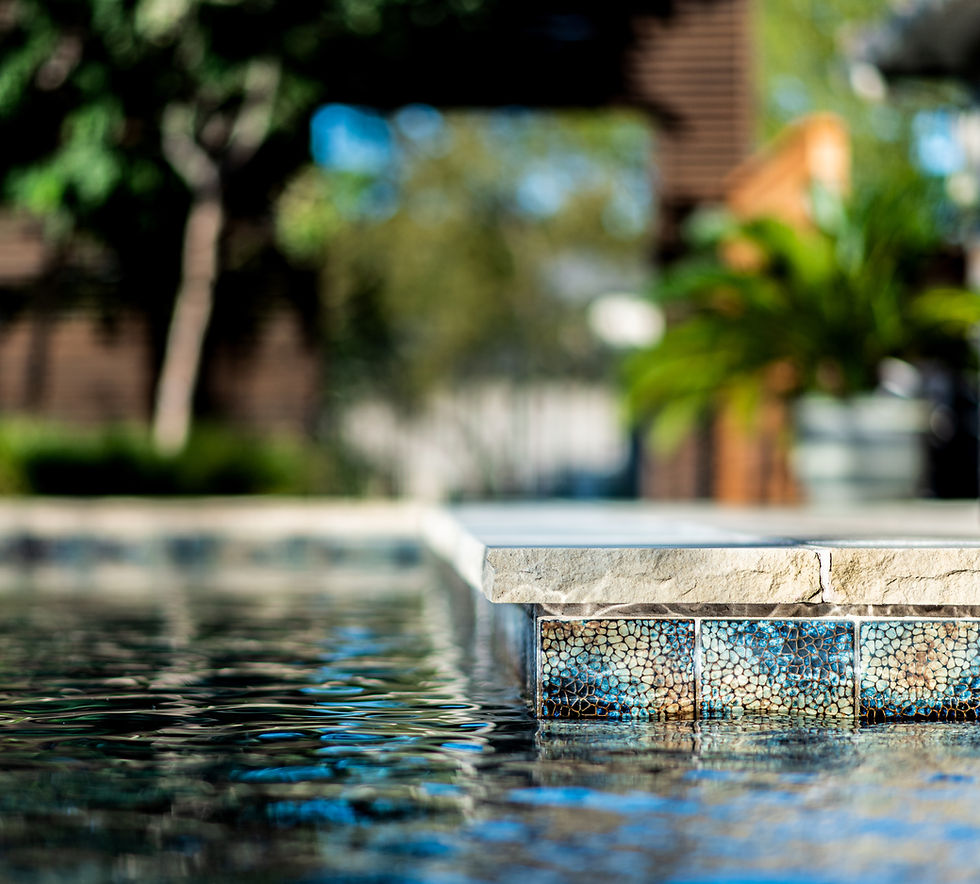Saltwater Swimming Pool Benefits You Need to Know
- Hopkins Custom Pools

- Aug 12, 2025
- 4 min read

What is a Salt Water Pool and How it Works
A saltwater swimming pool is not the same as swimming in the ocean, although the name sometimes causes confusion. In reality, a saltwater pool uses a salt chlorine generator to convert dissolved salt into chlorine through a process called electrolysis.
This system keeps your water clean while creating a swimming experience that is softer, smoother, and less irritating than a traditional chlorine pool. Many homeowners who have made the switch to saltwater systems report that their skin feels better, their hair is less brittle, and they enjoy longer swims without eye irritation.
A typical saltwater swimming pool contains far less salt than the ocean — about one-tenth the concentration — so you will not notice a salty taste when swimming. The water feels more like fresh water from a clean lake but has all the sanitizing power of chlorine without the unpleasant side effects that can come from manual chlorine dosing.
Does a Salt Water Pool Have Chlorine
Yes, a saltwater swimming pool does contain chlorine. The key difference is in how that chlorine is produced and maintained. Instead of adding chlorine tablets or liquid by hand, the salt chlorine generator automatically converts salt in the pool water into chlorine as needed.
This results in steady, consistent chlorine levels and eliminates the harsh chemical spikes that sometimes happen in traditional pools. The reduced fluctuation means the water stays more comfortable for swimmers, and the lower concentration of added chemicals makes the whole experience more pleasant.
Main Saltwater Swimming Pool Benefits
When comparing saltwater swimming pools to traditional chlorine systems, several benefits stand out:
Gentle on eyes and skin so swimmers avoid irritation
Lower ongoing chemical costs because salt is significantly cheaper than chlorine tablets
Water that feels smooth, soft, and “silky” against the skin
Reduced weekly chemical handling since the generator manages chlorine production
Less noticeable chlorine smell after swimming
Many pool owners also appreciate the convenience. With a saltwater system, you do not need to store large quantities of chlorine or worry about running out before a holiday weekend. The generator produces chlorine continuously as long as salt levels are in the proper range.
Pros and Cons of Saltwater Pools
While the benefits of saltwater swimming pools are impressive, there are some factors to consider before making the switch. The initial setup cost is higher because you must purchase and install a salt chlorine generator. Depending on your pool size, this can add several thousand dollars to the upfront investment.
Saltwater can also be corrosive over time, so it is important to use salt-safe fixtures, ladders, and pool equipment. Additionally, while the generator automates much of the sanitizing process, you will still need to monitor your water balance regularly to prevent issues like algae growth, cloudy water, or calcium buildup.
Saltwater Pool Maintenance Tips
Keeping the Salt Level Balanced
Maintaining proper salt levels is crucial for optimal performance. Most systems operate best between 2,700 and 3,400 parts per million (ppm). If salt levels drop too low, the generator cannot produce enough chlorine. If they are too high, the excess salt can damage pool equipment and surfaces.
Testing your salt levels every couple of weeks with a simple test kit helps avoid costly repairs and ensures your water remains perfectly balanced.
Cleaning a Saltwater Pool
Even though a saltwater system creates its own chlorine, regular cleaning is still necessary to keep your pool looking and feeling its best:
Skim leaves and debris from the surface every few days
Brush pool walls, steps, and ladders weekly to prevent algae buildup
Backwash or clean your filter as recommended by the manufacturer
Inspect and clean the generator cell every few months to remove calcium deposits
Monitor and adjust pH, alkalinity, and stabilizer levels regularly
Pro Tip: Like traditional pools, saltwater pools sometimes need a shock treatment, especially after heavy use, storms, or extended hot weather. This gives the chlorine levels a boost and helps keep algae at bay.
How Saltwater Pools Work Compared to Chlorine Pools
When comparing a saltwater vs chlorine pool, the main trade-offs come down to comfort, maintenance, and cost. Saltwater pools excel in swimmer comfort, softer-feeling water, and reduced chemical handling. Traditional chlorine pools have lower startup costs and do not require a generator, but they involve more frequent manual chlorine additions and chemical balancing. Some homeowners start with chlorine and convert to salt once they see the long-term benefits.
Common Myths About Saltwater Swimming Pools
They taste like the ocean – False. Salt levels are much lower than seawater, so the taste is minimal.
They do not use chlorine – False. Saltwater pools generate their own chlorine for sanitation.
They require no maintenance – False. While they require less hands-on chemical handling, they still need cleaning, testing, and occasional adjustments.
Final Thoughts on Saltwater Swimming Pool Benefits
The benefits of saltwater swimming pools are clear: softer water, fewer harsh odors, lower long-term chemical costs, and reduced weekly maintenance. They may require a higher upfront investment, but many homeowners find the comfort and convenience worth it. With the right care, a saltwater swimming pool can provide crystal-clear water and a better swimming experience for years to come.

%20Use%20Over%20W.png)




Comments